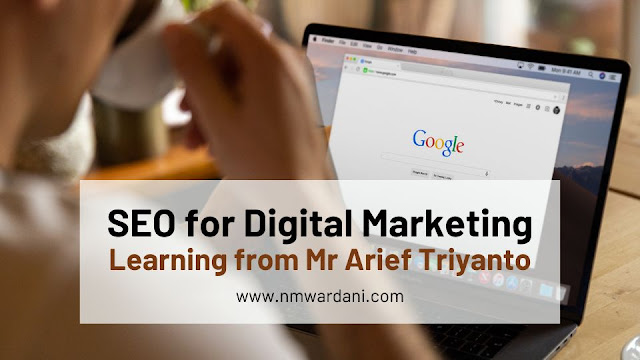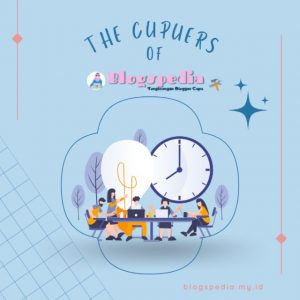I felt delighted when Blogspedia announced that for the Blogspedia online meeting on the 20th of April 2024, Mr. Arief Triyanto would present about SEO. As a newbie blogger, this is the topic I really need.
In this post, I share some of the insights about SEO from Mr. Arief Triyanto. I also give examples. I hope this post will benefit you, especially if you are a newbie blogger like me.
Nulla Aetas Ad Discendum Sera - It’s Never Too Late to Learn
I am grateful that Mr. Arief started the presentation by stating the popular quote from Lucius Annaeus Seneca (4 BC-65 BC): Nulla Aetas Ad Discendum Sera. When I looked up its translation in English, it said “It’s never too late to learn”. Another reference translates this as “No age is late for studying”. I interpret it like this: You can be old by people’s standards, but there is no age standard for learning.Starting over a career after the age of 30 indeed makes me feel nervous and inferior. Being surrounded by people, who also start learning in the later stage of their lives, encourages me to keep learning.
SEM versus SEO
Mr Arief mentioned two ways that are commonly used for digital marketing. Those are SEM and SEO. What is the difference between them?SEM stands for Search Engine Marketing. This is a way to market your product in search engines using ads. Because of this, you need some budget to do SEM.
SEO stands for Search Engine Optimization. SEO consists of techniques to optimize a website so that it will appear at the top parts of a search engine result.
How Search Engine Works
Crawling
Search engines crawl on your website to detect what articles are there on your website.Indexing
Then, the search engine will organize the results by indexing. Not all parts of your websites are indexed. When the search engine decides that a page is not important, then the page will not be indexed. This might include an error page, a search page, and comments in your blog.Ranking
The search engine will then rank your content according to the credibility of your website and relevance to what readers ask in the search engine.The Importance of SEO
Building brand awareness
If you have a new brand or a new product, you need to let people know about the product. That’s why businesses try to make their business website visible on search engines.Let’s say a customer is looking for a handmade soap on Google. She will first read the top five websites that offer handmade soap. I doubt that she will look at rank 20-30 on the search result.
Applying SEO and making the rank of our website higher in the search engines will increase the probability of the customer visiting our website and making a purchase.
Enhance user experience
When a search engine rank websites, it will also consider user experience of the website. A website, that is easy to navigate, fast to load, and responsive to any devices customers use, will rank higher in search engines.So, your website rank in Google can also indicate how well it performs on user experience.
Get sales from inbounds leads
Of course, the end purpose of making a business is to get more customers and more purchases. When your website ranks higher on search engines, new customers are more likely to visit it and consider using your product or service.Using keyword strategically
What search engines do is they are trying to answer readers’ questions that are entered in the search bar. Search engines will show the sites that probably answer the questions.
So bloggers need to understand what type of questions readers ask, and what words readers use. These words and phrases the readers use are what we call keywords.
By understanding SEO techniques, you can use the best strategies to use keywords in your content so that readers can get the answer.
Applying local SEO helps local customers
If you are aiming for local customers, you need to apply local SEO to your website. So, when writing your posts you include a specific place or town. For example, handmade soap in Sidney. The search results will show all related shops in Sidney.Applying SEO to Rank Better in Search Engine
Keyword research
There are many tools that a blogger can use to do keyword research. Some tools are free, some are paid. Mr. Arif suggests two tools that we can use: Google Keyword Planner and Ahref Keyword Generator.Using these keyword tools you can find as many keywords as possible that are related to your website. For example, if your shop sells handmade soap, your keyword might be handmade soap, soap shop, artisanal soap, soap maker, etc.
Also, consider long tail keywords. Long tail keywords are query phrases that consist of three or more individual keywords. For example: locally made artisanal soap in-sale.
After finding so many keywords, you might feel overwhelmed to decide which keywords you should use for your pages. At this point, you need to determine your priorities. That’s why you need to understand the purpose of the website and what your product actually needs.
In-depth tutorial for Google Keyword Planner will be posted at another time. So, stay tuned to our social media to keep updated on new articles.
Competitor research
To be rank first on Google, we also need to know our competitors. They are the brands that sell same or similar products. We must also search for their product’s superiority, how their product is similar to or different from our product, their target market, and what keywords they use for branding their products.
You can check your competitors using Google. For example, if you already decided that you are going to write a page entitled “Reasons why you should use handmade soap.” You can directly type your title in the search bar and see the top 5 websites on the list. Google can give more varieties of websites that rank highest related to reasons to use handmade soap. If you want to be more specific in the result, you can use allintitle:[your intended title] format. For example, you search allintitle:reasons why you should use handmade soap.
By understanding your competitor, you can write better articles than your competitor. You can give more value to readers than your competitor. This is how you have the chance to rank better than your competitor on search engines.
On-page optimation
On-page optimation means you create better articles for readers. It consists of two aspects: content and technical. In your content, you must mind your keyword choice, how and where you use images to enhance readers’ experience, and what important information the readers are expecting from reading your articles. In the technical aspect, you consider page speed and meta settings, such as meta tag, site tag, and meta description.
Off-page optimation
After publishing your articles, you can reach more audiences by doing off-page optimation, Off page optimation includes getting backlinks from other websites, sharing on social media, and you can do article marketing such as using ads.
There is still a lot of insight from our webinar session with Mr. Arief Triyanto. Some of them I will share with you in a deeper discussion in the next articles.
That’s all for now. See you in the next post.















Post a Comment
Post a Comment